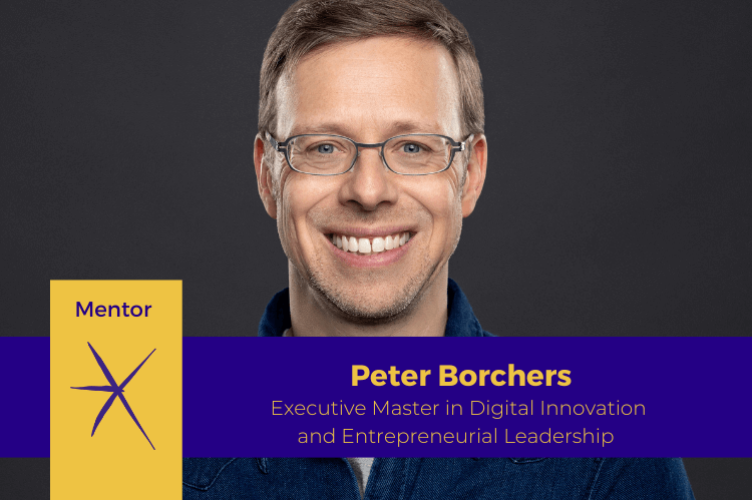Executive Master in Digital Innovation and Entrepreneurial Leadership
Meet the mentors: Peter Borchers
 Peter Borchers is an affiliate professor of Entrepreneurial Leadership and Strategy at ESCP Berlin campus. He is also a successful angel investor, keynote speaker and author. Named one of the Top 20 Digital Experts in Germany by Manager Magazine, Peter is passionate about innovation strategy.
Peter Borchers is an affiliate professor of Entrepreneurial Leadership and Strategy at ESCP Berlin campus. He is also a successful angel investor, keynote speaker and author. Named one of the Top 20 Digital Experts in Germany by Manager Magazine, Peter is passionate about innovation strategy.
As founder of hub:raum (the global seed VC and incubator of Deutsche Telekom), and the former CEO of Allianz X (the Allianz group's 500 million venture arm and company builder), his particular interest lies in the collaboration between established companies with start-ups, Venture Capital firms and high-tech companies.
Peter mentors participants in the Executive Master in Digital Innovation and Entrepreneurial Leadership (EMDIEL). His main topics are leadership, entrepreneurial thinking and action through transformative change processes.
We talked to Peter about his views on leadership and his enthusiasm for innovation strategies and ecosystems.
ESCP: Peter, you are part of the BMW Foundation’s global network of “Responsible Leaders”. What does responsible leadership in today’s world mean to you?
Peter Borchers: Responsible leadership, to me, is about guiding others with integrity, empathy, and a commitment to the greater good. It means making decisions that balance the needs of all stakeholders—employees, customers, shareholders, and the wider community. All the while being mindful of long-term impacts on society and the environment.
A responsible leader does not just focus on short-term gains. They consider the ethical implications of their actions and strive to foster a culture of trust, inclusion, and accountability. In essence, it’s about leading with a sense of purpose, ensuring that the success of the organization contributes to society.
ESCP: How do you endeavour to teach responsible leadership in the EMDIEL?
Peter Borchers: In the EMDIEL programme, I teach responsible leadership by encouraging entrepreneurial thinking and action. This year, I’m heavily involved in mentoring students as they work on practical projects. I focus on helping them think strategically and innovate effectively. I emphasize the importance of making decisions that are not only impactful but also ethically responsible. Thus, ensuring their entrepreneurial efforts contribute positively to both business success and society. I want to combine real experience with strong values to help them lead effectively and achieve lasting positive results.
ESCP: In your line of work, you see corporate cultures, entrepreneurial mindsets, and agile start-ups come together and perhaps clash here and there. What are specific leadership challenges when it comes to creating successful collaborations between such a diverse set of players?
Peter Borchers: Creating successful collaborations between corporations, startups, and entrepreneurial teams involves navigating several leadership challenges. Leaders must align differing objectives. Corporations often seek stability while startups pursue rapid innovation. Balancing the structure of established processes with the flexibility start-ups need to thrive is crucial. Managing cultural differences and building trust through transparency and open communication are also essential.
Additionally, overcoming resistance to change requires promoting adaptability and fostering a culture of continuous learning.
The key challenge is to integrate these diverse strengths into a cohesive effort that drives mutual success. Here is a real-world example:
I facilitated between a large corporation and a tech start-up. The corporation’s emphasis on rigorous approval processes initially clashed with the start-up’s need for rapid iteration. To overcome this, we created a hybrid project team with members from both organizations. This allowed for faster decision-making while still respecting the corporation’s standards. This approach not only aligned their goals but also built trust and fostered a shared commitment to the project’s success.
ESCP: Finally, as a former CEO of Allianz X, you have an extensive background in Venture Capital, and seed funding, and know your way around incubators. What business idea have you come across in the past that really stuck with you, and why?
Peter Borchers: One business idea that really stuck with me was focused on using AI and machine learning to personalize mental health care. The idea was to create a platform that not only connects users with mental health professionals but also uses data-driven insights to tailor therapy and self-care recommendations to each individual’s unique needs and circumstances. What struck me about this idea was the combination of cutting-edge technology with a deep understanding of a highly sensitive and impactful area—mental health.
The startup was addressing a significant gap in the market by making mental health care more accessible and personalized, something that traditional models often struggle with. The potential for scalability was immense, given the increasing demand for mental health services globally, especially in under-served regions. As we began our discussion with a focus on responsible leadership, the balance between innovation and responsibility in this idea truly made it stand out to me. It wasn’t just a viable business concept; it was one that had the potential to make a meaningful, positive difference in people’s lives.
Campus
